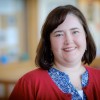This article is more than 5 years old.
The 2018 American Theological Library Association Annual Conference was held June 13-16 in Indianapolis. My conference started with a lovely walking tour of the historic architecture of downtown Indy, followed by a pre-conference workshop on building campus alliances in order to increase information literacy opportunities. The best piece of advice from this workshop was to have an “elevator pitch” in your mind for when you run into faculty or admin at events around campus!
The conference proper got off to a great start with the first of three plenary speakers. Timothy Beal (Case Western Reserve) shared his experience of learning how to code as a New Testament professor. He took on coding as a way to expand his options as a translator of ancient texts: a print translation forces the translator to prefer one translation, leaving the options for the footnotes, while a digital translation can leave those options open, allowing the reader to view the possibilities and giving space for new ideas to surface. Friday’s plenary speaker, Stephanie Crumpton (McCormick Theological Seminary) spoke about helping our students “crack the code” that surrounds reading and writing in academia. We assume, especially for graduate students, that our students come into academia understanding how to read and write and we create assignments based on those assumptions. We need to write assignments that direct the passion our students have for their subjects (“They just want to talk about God”) towards an engagement with the social contexts in which they live and work. David Lewis (IUPUI, ACRL 2108 Librarian of the Year) was our final plenary speaker on Saturday. He challenged us to think about what open scholarly communications looks like in the disciplines of theology and religious studies. He pointed out that Elsevier doesn’t really care about us, so we may have more opportunity than other disciplines to work in an open access environment!
The remainder of the sessions I attended were divided between discussions of teaching research and/or writing and presentations of online resources. In the sessions on research and writing, I picked up some new titles to consider for course readings (Digital Paper, Deluxe Transitive Vampire, Writing Your Journal Article in 12 Weeks, and books by Donald Murray) as well as some new ideas for assignments from colleagues at Vanderbilt and SMU. The sessions on online resources highlighted the work of the Association of Religion Data Archives, Baylor Digital Scholarship Text-Mining Projects, and the creation of a relational database of the archives of a Syriac Orthodox Patriarchal monastery in Turkey. In addition to being fascinating, all of these presentations discussed the logistics of their projects and their database architecture, which was particularly helpful to me.
Lastly, I also presented at two sessions! I participated in a panel and shared how I use Twitter for collection development and broadening my disciplinary knowledge and networks, on Thursday. In my own session on Friday, I presented on the development and implementation of my two research and writing courses for the School of Divinity. Both sessions were really well attended and I received a lot of questions and positive feedback from both. Overall, it was a very successful and eventful conference for me this year! I would be glad to share additional information or notes if anyone has further questions on any of the sessions I mentioned!

6 Comments on ‘Kaeley at ATLA 2018’
Who would have thought that “Elseivier doesn’t really care about us” would be A) seen as a good thing and B) such a thought-provoking statement – but he’s not wrong….great write-up!
Congratulations on a great conference Kaeley and especially on your presentations.
After a busy academic year, it’s a challenge to focus on putting something like that rtogether-kudos for your innovative presentations.
Theology, twitter, *and* vampires, a very well-rounded conference. Congratulations on a successful conference, Kaeley!
That’s great that other people recognize the value of your work.
Thanks for telling me more about how Twitter helps you with collection development!
Be happy that Elsevier doesn’t care about you. 😉 I’d love to hear more about Timothy Beal’s coding work – what a cool application!